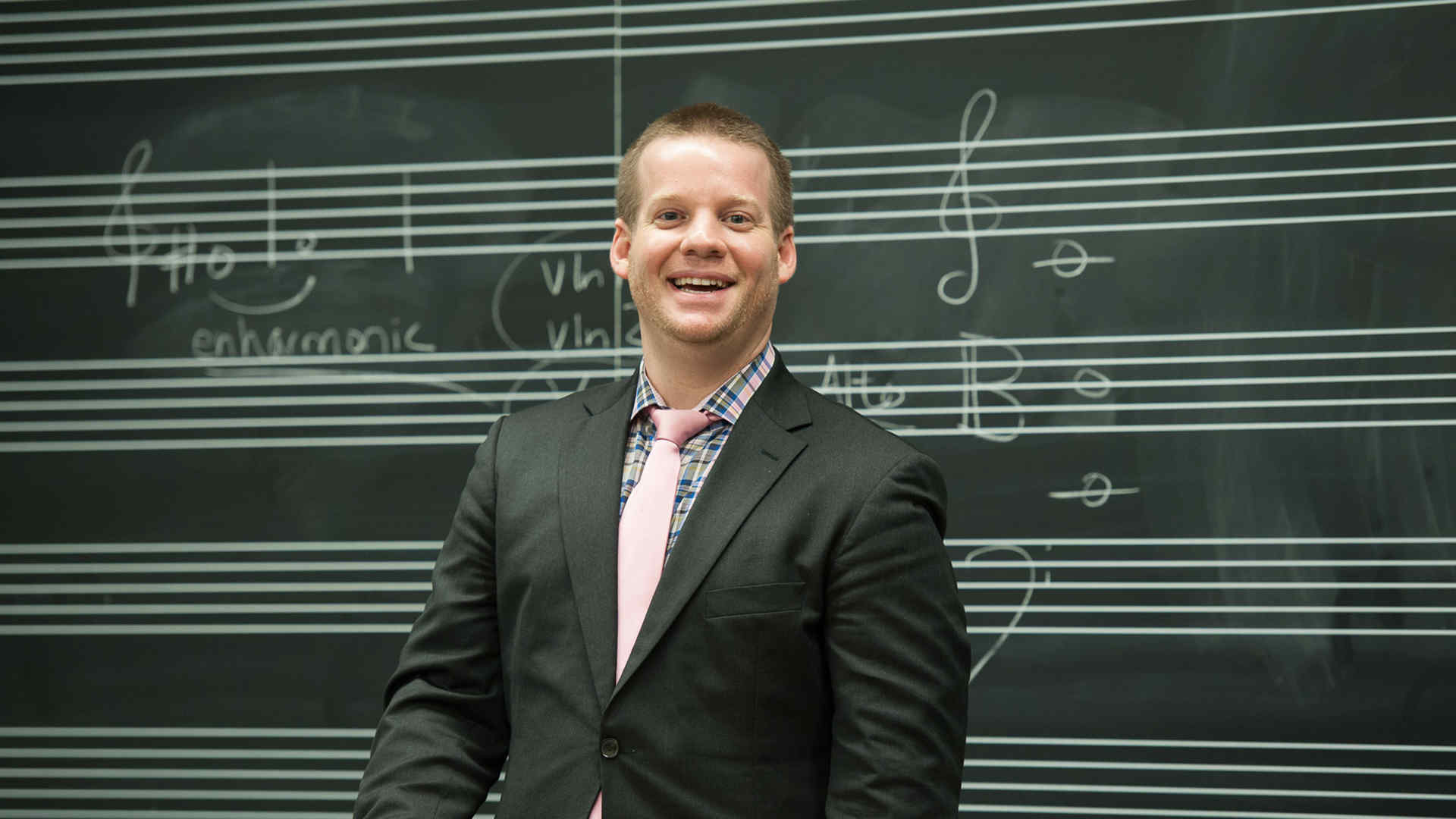
Ear Training Faculty and Chair of Pre-College Ear Training and Theory
Kyle Andrew Blaha (MM ’06, DMA ’11, composition) reports that he was so scared he was shaking in his first Ear Training class at Juilliard, in 2004. Longtime department chair Mary Anthony Cox (BM ’65, MM ’68, piano; faculty 1964-2013) “could be very intimidating,” he reports—to the surprise of approximately no one who ever studied with her. Still, he says, “After two weeks or so, I was her biggest fan and was inspired by the material and her dedication to teaching it.” And nine years later, just after Cox retired, he joined the department, which is now led by the teaching fellow who first taught Blaha, Wayne Oquin MM ’02, DMA ’08, composition; faculty 2008–present). Blaha had come to Juilliard by way of Eastman School of Music where he got his bachelor’s in composition with minors in clarinet and German. He’s currently teaching six Ear Training classes and various Music Theory and Analysis classes.
How did you become interested in music?
I grew up in Belleville, Ill, a St. Louis suburb, and in fourth grade at Our Lady Queen of Peace Grade School, there was an instrumental demonstration that students could attend if they were interested in playing in the school band. I saw the clarinet and was obsessed—I was an eccentric kid. Within a few years I was also playing flute, piccolo, euphonium (!!!), and beginning a lifelong, complicated relationship with the piano. My band director was Vicky Smolik, an amazing trumpeter who played with the St. Louis Symphony; I owe so much to her.
What’s a recording that inspired you early on?
Playing in an orchestra as a little tater tot influenced me more than anything. I’ll never forget playing Scheherazade in eighth grade with a youth orchestra—every rehearsal was mind-blowing. I vividly recall hearing harmonics for the first time during the violin cadenzas, and I had no idea what they were, or why they sounded different from the other notes. My mom took me to a library in the big city— St. Louis—where I could check out the score.
What was most surprising about transitioning from student to faculty member?
I like to think the transition was seamless. Mary Anthony Cox was both my and Wayne Oquin’s mentor. She took pride not only in training good Ear Training teachers but also respectful people who could function at any institution, and she took it extremely seriously. This training also involved how to interact with the staff and administration, or, as she called them, “the second floor.”
What do people say when you tell them you teach Ear Training?
This is a tough one for people with no musical background. I used to say that I teach Ear Training, and they would look at me blankly. I then started explaining what Ear Training entailed, and their eyes widened as if it was some sort of witchcraft. Furthermore, I cannot tell you how many times after saying that I teach at Juilliard, someone would look at me surprised and ask, “You teach dance?!” Now, I just say I’m a teacher.
If your students could only remember one thing from your teaching, what would you want it to be?
I would stress two things: working hard and loving your work. You can tell when someone loves what they are playing/doing and who they are doing it with—it’s a feeling beyond description. Regarding hard work, again I must bring up a Ms. Cox story. One day I flippantly remarked to her how busy and tired I was. She responded, “You want to be busy. If you aren’t busy in this industry, there is a problem.”
What are some of your nonmusic interests?
I’m a huge yogi, and I have a mild fear of flying that I manage by studying airplanes, airlines, and airports. In my free time, I love learning languages and traveling the world.
What are you reading/listening to/watching/following these days?
James Blake’s Meet You in the Maze and Bruckner’s Seventh Symphony break my heart daily. And, don’t judge, but I’m a huge fan of Judge Judy. I can’t believe I put that in print.
If you weren’t in the career you are in, what would you be doing?
If my rescue kitten, Mr. Sibelius, and my partner, Sean, could come with me, I would work in some capacity at the American Embassy in Cairo. I studied Arabic there a number of years ago and I’d love to go back, even though the staff at the hotel where I stayed then thought I was some sort of FBI informant because they couldn’t imagine someone wanting to learn Arabic for fun.
What question are you asked most?
How do you take your iced coffee?
What do you wish you were asked?
How can I improve my Ear Training skills?